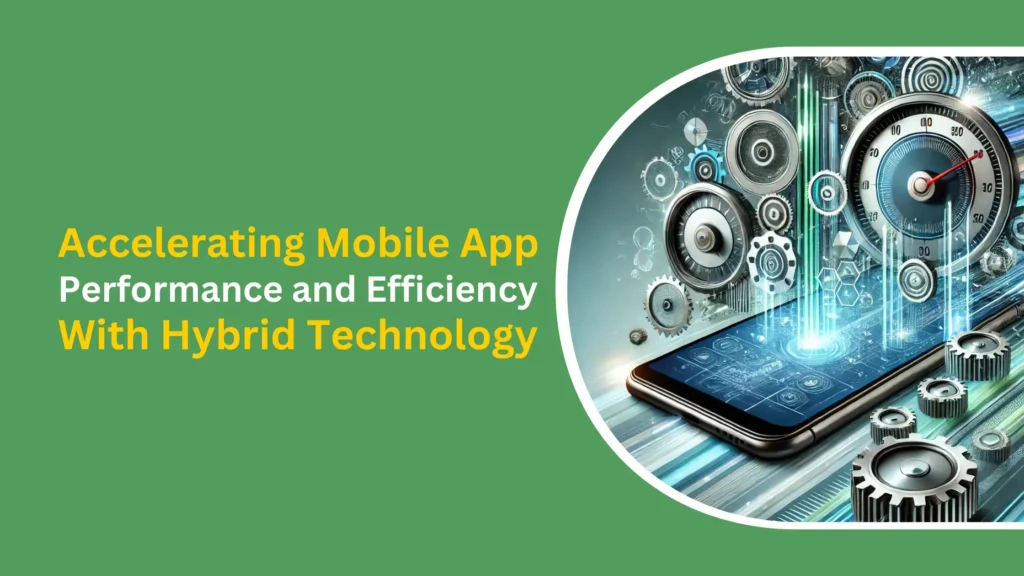Mobile applications are essential in our daily lives, both personally and professionally. Because we rely heavily on these apps, it is important for them to work well and efficiently. Hybrid technology helps developers improve the performance of mobile apps. In this exploration, we look at how hybrid technology can improve your mobile app. We will cover key topics like Mobile App Performance Optimization and Future Trends. Optimizing mobile app performance is crucial for providing smooth and effective experiences that engage users. Hybrid technology offers a strong solution by combining good performance, cost savings, and the ability to work across different platforms.
Mobile App Performance Optimization
Why Performance Matters
- User Retention: Slow or unresponsive apps frustrate users and lead to high uninstall rates.
- Brand Reputation: Poor app performance can hurt a brand’s reputation and lower customer satisfaction.
- Competitive Advantage: Apps that work well have an edge over competitors by giving users a better experience.
- Increased Engagement: Fast and efficient apps make users spend more time using them.
Key Aspects of Mobile App Performance
- Startup Time: The time it takes for the app to launch and become usable.
- Responsiveness: How quickly the app reacts to user input (e.g., taps, swipes).
- Frame Rate: This measures how smoothly animations and transitions run.
- Memory Usage: This shows how much memory the app uses on your device.
- Battery Life: This indicates how the app affects your device’s battery.
- Network Usage: This tells you how much data the app consumes, especially when using cellular networks.
Hybrid Technology and Its Benefits
What are Hybrid Apps?
Hybrid apps combine features of native and web applications. They use web technologies like HTML, CSS, and JavaScript. These apps are packaged in a native container, allowing users to install and run them on mobile devices just like regular apps
Key Advantages:
- Cross-Platform Development: Create one codebase that works on iOS, Android, and the web. This saves time and reduces costs in development.
- Faster Development Cycles: Use web technologies and frameworks to speed up development. This helps you create prototypes quickly and make improvements in short iterations.
- Cost-Effectiveness: Organizations can achieve significant savings in development time and costs by reusing code across multiple platforms.
- Access to Native Features: By utilizing plugins, developers can harness native device functionalities such as the camera and GPS, thereby enhancing the application’s overall capabilities.
Top Hybrid App Frameworks
Several powerful frameworks facilitate hybrid app development:
- React Native: Developed by Facebook, React Native leverages React’s declarative paradigm to build native-rendered components, offering strong performance and a large community.
- Flutter: Flutter is a tool developed by Google that helps you create apps. It uses a special rendering engine called Skia and the Dart programming language, which means it works fast and has lots of ready-made user interface (UI) components.
- Ionic: Ionic is based on web standards and provides many UI components and tools. This makes it easy to build attractive and interactive apps.
- Xamarin: Powered by Microsoft, Xamarin allows developers to build native Android, iOS, and Windows apps with C#. It provides excellent performance and strong integration with .NET.
Efficient App Design for Performance
- Optimize UI/UX: Minimize UI Elements: Reduce visual clutter and only include essential elements.
- Streamline Navigation: Design intuitive navigation flows to minimize user effort.
- Prioritize Core Interactions: Ensure smooth and responsive interactions for critical app functionalities.
- Network Optimization: Implement caching mechanisms to store frequently accessed data locally, reducing reliance on network requests.
- Image Optimization: Compress images and use appropriate formats (e.g., WebP) to minimize file sizes.
- Efficient Data Loading: Implement lazy loading to load data only when necessary.
- Performance Profiling: Utilize profiling tools to identify performance bottlenecks and optimize code accordingly.
Mobile App Performance Optimization
- Startup Time: Optimize app startup time by minimizing the initial load of resources and utilizing techniques like code splitting.
- Responsiveness: Ensure smooth and immediate responses to user interactions (taps, swipes, gestures).
- Frame Rate: Maintain a consistent frame rate for smooth animations and transitions, enhancing user experience.
- Memory Usage: Minimize memory consumption to prevent app crashes and improve overall device performance.
- Battery Consumption: Optimize resource usage to minimize battery drain and improve user experience.
Testing and Iterative Improvements
- Thorough Testing: Test different devices and operating systems to find and fix performance problems.
- Utilize automated testing tools to accelerate the testing process.
- User Feedback: Gather user feedback through app store reviews, in-app surveys, and other channels.
- Review user feedback: To find ways to improve and fix any performance issues.
- Continuous Improvement: Regularly update the app with new features, bug fixes, and performance optimizations based on user feedback and testing results.
Future Trends in Hybrid App Development
Enhanced Performance: Continued advancements in hybrid frameworks are narrowing the performance gap with native apps.
AI/ML Integration: Increasing integration of AI and ML capabilities within hybrid apps (e.g., personalized recommendations, predictive analytics).
Progressive Web App (PWA) Enhancements: PWAs are evolving to offer more native-like features and performance, blurring the lines between web and hybrid apps.
Focus on User Experience (UX) and User Interface (UI): Emphasis on micro-interactions, animations, voice and gesture-based interactions, and accessible design.
Cloud-based Development Platforms: Streamlining the development process with cloud-based tools and platforms.
Conclusion
Hybrid app development offers a compelling solution for businesses seeking to accelerate mobile app development while maintaining high performance and efficiency. By using the strategies in this developers can create hybrid apps that engage users and perform well. These apps will provide great user experiences, boost user engagement, and help businesses succeed in the competitive mobile app market.
Visit our website, www.everitesolutions.com, to learn more about our accelerated mobile app development services. Contact us at email id info@everitesolutions.com or our mobile number +1 404-835-1605 to schedule a consultation and discover how Everite can help shape your business’s future.


